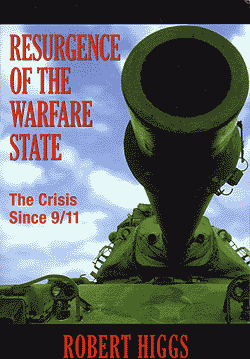 Now RESURGENCE OF THE WARFARE STATE presents the incisive and prophetic
analyses of Dr. Higgs since 9/11. No aspect of the "war on terror" is
overlooked as Dr. Higgs critically looks at the invasions and
occupations of Afghanistan and Iraq, airport security, the politics and
propaganda of war, civilian and military deaths, government defense and
non-defense spending, civil and economic liberties, and much more.
Now RESURGENCE OF THE WARFARE STATE presents the incisive and prophetic
analyses of Dr. Higgs since 9/11. No aspect of the "war on terror" is
overlooked as Dr. Higgs critically looks at the invasions and
occupations of Afghanistan and Iraq, airport security, the politics and
propaganda of war, civilian and military deaths, government defense and
non-defense spending, civil and economic liberties, and much more.
"In his very powerful and incisive book, Resurgence of the Warfare
State, Robert Higgs is a prophet who deserves honor-and more
importantly, urgent attention. The earliest pieces in this book, written
a year and more before the onset of the Iraq War, prove uncannily
accurate in their predictions of the terrible course of events. They
demonstrate that his passionate warnings in the book's more recent
essays demand to be taken with the utmost seriousness."
- DANIEL ELLSBERG, author, Secrets: A Memoir of Vietnam and the Pentagon
Papers
"Robert Higgs's Resurgence of the Warfare State strikes a telling blow
for liberty and merits a thunderous welcome by Americans. Laying bare
the post-9/11 vacuity of the bipartisan cant and moral cowardice of the
Executive Branch and Congress, Higgs deftly shows that while these
paragons of demagoguery and self-interest shout patriotic bromides about
protecting freedom, they are quietly curtailing civil liberties, making
the U.S. economy ever more dependent on arms makers, and waging
offensive wars which are constitutionally unconscionable."
- MICHAEL SCHEURER, former CIA Senior Counter-terrorism Analyst
Synopsis
Soon after the terrorist attacks of September 11, 2001, the news media contacted Independent Institute Senior Fellow Robert Higgs, whose 1987 book Crisis and Leviathan: Critical Episodes in the Growth of American Government explained how national emergencies have increased the size of government at the expense of individual liberty. The steady demand for press inter-views prompted Higgs to author scores of newspaper op-eds, think-tank policy briefings, and Internet postings in which he argued that the U.S. government's response to 9/11, like its responses to past crises, was taking us down the road to more government and less liberty.
Resurgence of the Warfare State: The Crisis since 9/11 brings together Robert Higgs's "real time" analyses of the U.S. response in the three-and-a-half years that followed the September 11th terrorist attacks.
Higgs paints a bleak picture, showing how America's political leaders in the name of "crisis management" have discarded many of the checks and balances created to thwart potential abuses of government power, spent additional billions of dollars on programs unrelated to national security, trampled civil liberties and due process at home, and pursued reckless military adventures that have needlessly killed thousands of innocents abroad.
Part I: Crisis and Leviathan, Again
Major crises such as the Great Depression and the world wars prompt the public to demand that the government "do something." When the crises end, many emergency actions cease— but not all. Each emergency thus ratchets up the size of government and diminishes our economic and personal freedoms. The U.S. response to 9/11 has repeated this pernicious pattern, Higgs explains.
Nine days after 9/11, Higgs told Reason magazine (in an interview reprinted in chapter 1) that the "war on terrorism" would again enlarge the government—even in ways unrelated to national security—doling out pork to well-connected interest groups and bringing us ever closer to the realization of the Big Brother State. James Madison, the architect of the U.S. Constitution, had warned that war is the worst enemy of liberty, Higgs observes.
Part II & III: Airport (In)Security and the Draft
Two examples of how 9/11 has panicked people into advocating bad policies are the federalization of airport security and calls for reinstating the draft. The Transportation Security Ad-ministration was created to try to assure air passengers that the federal government was making them safer. But like other large bureaucracies, the agency soon suffered scandals that suggest it lacks real accountability and is prone to politicization.
Proponents of military conscription claim that improving pay and benefits wouldn't entice enough people to join the military, but the "national glory" rhetoric of draft advocates suggests that they're not very interested in trying to find out. Favorable talk about reinstating the draft indicates that in post-9/11 America, freedom has many fair-weather "friends" who would sacrifice liberty for security (and likely make us less se-cure).
Part IV: The Military-Industrial-Congressional Complex (MICC)
Forty years of Cold War military spending did not protect the Pentagon and the Twin Towers from a devastating attack. The Pentagon was—and still is—spending billions on Cold War–era arms and equipment and devoting relatively few resources to counter the new threat of terrorism.
"Bizarrely, even the granddaddy of all military boondoggles, the ballistic-missile-defense system, has regained its momentum in the aftermath of the terrorists' use of nonballistic missiles conveniently made available by United Airlines and American Airlines," writes Higgs. "Just as the Korean War had served as the pretext for vastly increasing military spending on weapons and forces positioned worldwide, the so-called war on terrorism now serves as the pretext for throwing money at every constituent in the MICC."
Never satisfied until a maximum amount of the defense budget has been diverted toward buying votes for their reelection, members of Congress strongly resist reallocations away from the established Cold War programs that currently channel taxpayer money to their political backers, Higgs explains. He also takes on three popular myths about the Defense Department—as well as a few sacred cows about the White House leadership itself.
Part V: Bush and the Bushies
President George W. Bush has spoken of his so-called "faith-based" domestic initiatives, but his foreign policy also warrants that label, given its clash with the empirical realities that have plagued nation-building throughout history, Higgs argues. Bush's ambitions of wartime "greatness" parallel the flaws promoted in a book he reportedly has read, The Supreme Command: Soldiers, Statesmen, and Leadership in Wartime, by neo-conservative war hawk Eliot A. Cohen.
Higgs also notes the parallels between the Bush White House and that of John F. Kennedy. Not only did Bush and Kennedy share similar backgrounds and ambitions, the coterie of each ?t the profile of the "power elite" described insightfully in the (otherwise often flawed) writings of the late sociologist
C. Wright Mills half a century ago. In his 1958 book The Causes of World War Three, Wright coined another term that Higgs argues ?ts Bush's foreign policy: "crackpot realism."
Part VI: The Road to War
Higgs's analysis of the pre-war rationale for the March 2003 U.S. invasion of Iraq was prescient. The evidence for Saddam Hussein's WMD programs proved highly flawed. Also, Bush's breach of John Quincy Adams's dictum (America "goes not abroad in search of monsters to destroy") was soon seen by many as naked aggression. Members of Congress failed to challenge the President's unconstitutional assertion of war-making power.
"A deeper patriotism—an allegiance to the principles of the American republic—lies beyond their comprehension," writes Higgs. "Congress may posture and pretend, but it will do nothing substantial to exercise its constitutional authority to decide whether to commit the nation to war."
The White House's pre-war prevarications followed a presidential tradition, Higgs argues, citing William McKinley's insincere rationale for the U.S. occupation of the Philippines after the Spanish-American War, as well as Woodrow Wilson's and Lyndon Johnson's similar duplicity during World War I and the Vietnam War, respectively. Had the highest priority been to thwart an emergent WMD threat, Saddam Hussein's Iraq would not have topped the U.S. hit list, according to Higgs.
Part VII & VIII: Monetary and Human Costs
Among the worst consequences of the Iraq War were the deaths of innocent civilians due to the (misnamed) "precision bombing" of densely populated areas, Higgs argues. A 2,000 pound JDAM "smart bomb" is supposed to strike within 13 meters of its target, as compared to an error range of 60–70 meters for its less-sophisticated counterpart. But in Baghdad, a city of 6.4 million people comparable in area to Boston or Detroit, and in other densely populated Iraqi cities even this degree of precision could not guarantee zero civilian deaths.
The inevitability of civilian casualties—along with the status of the Iraq War as an optional "war of choice"—made the decision to engage in aerial bombing highly immoral, Higgs argues. Yet for the U.S. policymakers who made the decision to attack, the future looks bright.
Rather than face its failures squarely, the White House shifted its war rationale to emphasize that the world now has one less dictator. Was this outcome a net gain for justice? Had Americans known the consequences of invading Iraq, would enough of them have voluntarily paid a pro rata contribution of, say, $2,000, to cover all of the costs to the country? No, Higgs argues, that would have been an offer they likely would have refused.
– Review: e@undercurrents.org



 Now RESURGENCE OF THE WARFARE STATE presents the incisive and prophetic
analyses of Dr. Higgs since 9/11. No aspect of the "war on terror" is
overlooked as Dr. Higgs critically looks at the invasions and
occupations of Afghanistan and Iraq, airport security, the politics and
propaganda of war, civilian and military deaths, government defense and
non-defense spending, civil and economic liberties, and much more.
Now RESURGENCE OF THE WARFARE STATE presents the incisive and prophetic
analyses of Dr. Higgs since 9/11. No aspect of the "war on terror" is
overlooked as Dr. Higgs critically looks at the invasions and
occupations of Afghanistan and Iraq, airport security, the politics and
propaganda of war, civilian and military deaths, government defense and
non-defense spending, civil and economic liberties, and much more.
 Robert Higgs is a Senior Fellow at The Independent Institute and Editor of the Institute's quarterly journal, The Independent Review. He received his Ph.D. in economics from Johns Hopkins University and has taught at the University of Washington, Lafayette College and Seattle University. He is the author of The Transformation of the American Economy 1865-1914, Competition and Coercion, and Crisis and Leviathan, recognized as one of the classic works on the growth and abuse of government power.
Robert Higgs is a Senior Fellow at The Independent Institute and Editor of the Institute's quarterly journal, The Independent Review. He received his Ph.D. in economics from Johns Hopkins University and has taught at the University of Washington, Lafayette College and Seattle University. He is the author of The Transformation of the American Economy 1865-1914, Competition and Coercion, and Crisis and Leviathan, recognized as one of the classic works on the growth and abuse of government power.